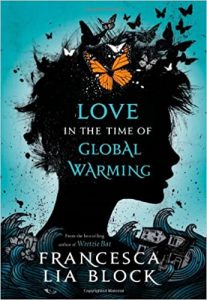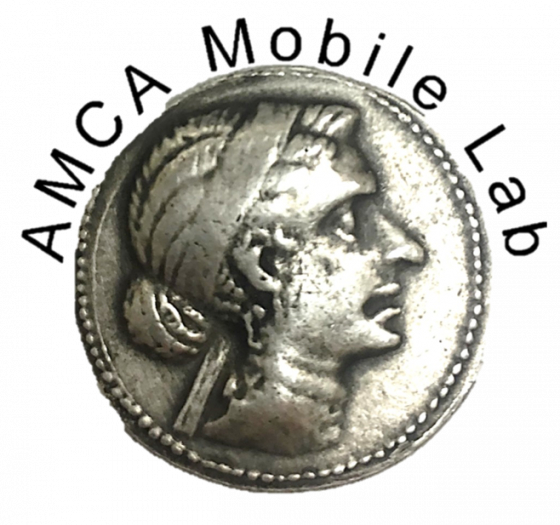 A couple weeks ago, students in Dr. Kvapil’s FYS class participated in the first meeting of the Heroic Temper Book Club. The assigned book was Love in the Time of Global Warming by Francesa Lia Block, published in 2014.
A couple weeks ago, students in Dr. Kvapil’s FYS class participated in the first meeting of the Heroic Temper Book Club. The assigned book was Love in the Time of Global Warming by Francesa Lia Block, published in 2014.
Students had the option to write a review of the book, and Katie Briner, Campbell Collinsworth, Robert Edwards, Cassie Royal, and Breanna Van Dreel took the opportunity to jot down their thoughts after the meeting. Here is a mash up of their reviews! (reviews have been lightly edited for style)
Plot
Katie: “It’s the apocalypse. Nothing is off the table, even love. There are giants, magic, climate change, and The Odyssey. How do relationships develop in such a scary time? Francesca Lia Block’s Love in the Time of Global Warming, the first in a series using ancient Greek and Roman novels as jumping points, provides an answer to this question.”
Robert: “The story starts after an apocalyptic causing earthquake known as the “Earth Shaker” all but completely destroying Los Angeles. Our main protagonist, a seventeen-year-old girl named Penelope (Pen) and who believes she is the last survivor, sets out on an adventure through the wastelands in search of her family. On her journey she makes allies with those she encounters and will see many unbelievable things. Whether or not Pen will make it to her family will depend on her willpower, her luck, the strength of her companions, and maybe a little bit of “magic”.
Katie: “Their journey is not without its struggles. Not only do the giants interrupt their journey and cause them to falter, but sirens and temptresses do too. The characters that interrupt their journey are directly correlated to those that impede upon Odysseus’ journey in the Odyssey. Pen and her friends see the similarities to their story in the Odyssey as they read it along their adventure. Despite the surprises along the way, Pen finds the people that she needs and keeps her relationships close to her, even with the plot twisted ending.”
Cassie: “This book includes, but is not limited to: romance, diversity, mutant test-lab giants, and sirens with extreme plastic surgery.”
Characters
Katie: “Love in the Time of Global Warming follows the story Pen as she attempts to find her mom and brother (Venice) in an apocalyptic world. Giants rule the cities, humans are few and far between, and nothing is growing. The audience watches as Pen struggles to find her family, while meeting lots of new characters along the way.
Campbell: “Pen is the main character whose journey the story is largely focused on. Readers get to see her exploration of destroyed Los Angeles, and how she navigates love in such unprecedented times.
Cassie: “A mysterious man (Merck) who claims to be a friend gives her a map and van to find her family; she uses the map as well as a copy of the Odyssey to guide her journey. She finds love with a boy she is traveling with (Hex) and discovers more about herself through their relationship.”
Campbell: Hex becomes Pen’s lover throughout the journey. I liked that we find out more and more about the characters as the story progresses, and Hex is a perfect example of this.”
Katie: “As a group of misfits (Pen, Hex, Ez, and Ash) begins to take shape, so do their relationships and plans.”
Robert: “The 2 main protagonists, being Pen and Hex, become a couple by the end of the novel but it doesn’t feel worth it in the slightest, as their relationship is heavily rushed in the last quarter of the book going from friends to intense lovers seemingly overnight.”
Cassie: “My favorite relationship was between Pen and Ez. Their connection was much more natural in my opinion and was a better representation of strong friendships that occur almost instantly.”
The Influence of the Odyssey
Campbell: “The Odyssey plays a large looming role in this book. It focuses on a journey where the characters face many obstacles like that of Odysseus. Much of the Odyssey references are very in your face which was something that I could have done without. The author made sure to make it very obvious whenever she was trying to make reference to Homer’s epic poem.”
Robert: “The story is frequently interrupted by quotes from the Odyssey, because it is one of Hex’s favorite stories, and Pen noticed the similarities between the story and what is happening to them. The issue stems from how in-your-face the Odyssey references are, to the point that it takes you out of the reading every time one occurs.”
Robert: “The lyricalness in the writing structure is a pleasant surprise and that by itself does a good job imitating Homer’s writing style, as opposed to the abrupt interruptions found when the characters read passages from the Odyssey.”
Katie: “The references were [also] few and far between, and when they were there, they seemed to be thrown in as an afterthought.”
Robert: “The coherence of the story would only benefit from removing the blatant Odyssey references.”
Positive Aspects
Cassie: “This book was a really easy, quick read. It kept my attention, despite the fact that I am not an avid reader, so the constant action kept things interesting and I really appreciated how quick-paced the story was.”
Campbell: “In my opinion, the book is easy to judge, but there are some redeeming qualities found within. Looking at the positives of the book: it is a quick and engaging read. The book is very quick paced and action packed, so it was easy to read through and was not boring at all. Some may critique this and suggest that the book moves too quickly, but it made the book engaging.”
Breanna: “Block clearly tried to write an inclusive story, including several LGBTQIA+ characters and a female protagonist, however she barely touched on any of the issues faced and only discussed it briefly and then almost completely cut it out of the story. I admire her for not making their sexuality their only personality trait however discussing how it makes them vulnerable and then having holes in that thought process seemed like a mistake an amateur writer would make.”
Cassie: “I also liked how inclusive it was, even though sometimes it felt forced, like Block sometimes included diverse characteristics just to seem more inclusive without it adding much to the story.”
Negative Aspects
Robert: “This novel suffers from a major identity crisis; it tries to be that of an epic quest, a grounded science fiction novel, a queer love story, and an homage to Homer’s writings. However, it misses the mark on every single one of those points. The structure of the novel is also extremely lackluster, it feels as if all of the ideas the author wanted to include are held together by Elmer’s glue and scotch tape; going from event to event in rapid succession with no real coherence to it.”
Katie: “There was a lot of build up at the beginning for plot points that I expected and wanted, but never actually happened. Although this can be described as unpredictability, it was not the kind that one would want. Since the plot didn’t follow through on the points that I wanted as a reader for the story to be satisfying, the ending ended up being quite disappointing and honestly a little too perfect.”
Robert: “The surprise of Hex being transgender is used to create momentary drama between the two [Pen & Hex]; however, it is forgotten about essentially right after it is mentioned, making it seem like the author wanted to simply mark off a check mark on a diversity list rather than create a compelling trans character.”
Breanna: “Our group enjoyed talking about it because it was easy to dissect and there were a lot of things to discuss however the general consensus is that we did not like the book. I personally disliked the book because I found that the plot holes and unanswered questions left much to be desired however I think this could be attributed to age and more experience looking for these connections, leading me to assume that a younger audience would enjoy it better. There were a few unnecessary sexual scenes scattered throughout the book so I’d say anyone between 6th and 11th grade would have a good time with this particular book.”
Cassie: “Most of the time I felt there were too many corny elements added, such as a lot of the “magic” and supernatural powers. Considering I am not the biggest fan of science fiction, I might be more biased against it, but I didn’t find the magical elements convincing and it made the story more fatuous, in my opinion. But I won’t go too in depth with that because I am more biased against it.”
Cassie: “This book brings up good and important discussion ideas, especially for young adults. But for someone looking for a pass-time book, I would not recommend it. Using this book in a higher-level classroom or book-club setting would be the way to go, in my opinion, to bring up discourse on relevant issues.”
Final Thoughts
Campbell: “Overall, this is not a book that I would choose for myself outside of a classroom setting. The book was written with the intention of being read by a younger audience, so this could be a reason for my distaste. It was interesting to see an author tie their work so closely to The Odyssey, but I am not sure that it worked in this case.”
Breanna: “There is at least one more book in the series so it is possible that some of these questions will be answered but given the author’s style of writing I find it unlikely and expect that more questions will come up with the second book as well.”
Robert: “The author’s appeal to diversity seems nice at first glance but falls short when you take a close look as said traits seem more focused on filling a checkbox than actually being competent characters. The story reads more like someone trying to turn a dream they once had into a novel as opposed to work of someone with almost 2 decades of experience and 41 previous works under their belt by the time of writing this book.”
If you are interested in reading the book, you can find copies new and used on Amazon or other book shops, and don’t forget to check your local public library!
